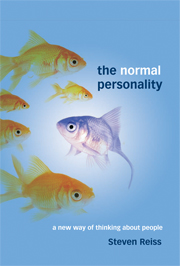Book contents
- Frontmatter
- Contents
- Acknowledgments
- Overview
- 1 My Wife Thinks Something Is Wrong with Me
- 2 The Sixteen Basic Desires
- 3 Intensity of Basic Motivation
- 4 Normal Personality Types
- 5 Overcoming Personal Troubles
- 6 Six Reasons for Adolescent Underachievement
- 7 Self-Hugging and Personal Blind Spots
- 8 Relationships
- 9 Reinterpretation of Myers-Briggs Personality Types
- 10 The Sixteen Principles of Motivation
- APPENDIX A Dictionary of Normal Personality Traits
- APPENDIX B Reiss Motivation Profile Estimator
- APPENDIX C The Sixteen Basic Desires at a Glance
- Notes
- References
- Index
5 - Overcoming Personal Troubles
Published online by Cambridge University Press: 05 June 2012
- Frontmatter
- Contents
- Acknowledgments
- Overview
- 1 My Wife Thinks Something Is Wrong with Me
- 2 The Sixteen Basic Desires
- 3 Intensity of Basic Motivation
- 4 Normal Personality Types
- 5 Overcoming Personal Troubles
- 6 Six Reasons for Adolescent Underachievement
- 7 Self-Hugging and Personal Blind Spots
- 8 Relationships
- 9 Reinterpretation of Myers-Briggs Personality Types
- 10 The Sixteen Principles of Motivation
- APPENDIX A Dictionary of Normal Personality Traits
- APPENDIX B Reiss Motivation Profile Estimator
- APPENDIX C The Sixteen Basic Desires at a Glance
- Notes
- References
- Index
Summary
We will consider the implications of the sixteen basic desires for coaching/counseling people to overcome personal troubles. These problems can cause significant unhappiness for months or even years, but are they mild mental illnesses? Do personal troubles have anything to do with “real” mental illnesses such as Schizophrenia or Mania? Freud (1951/1901) thought so, but I disagree.
Freud believed that personal troubles are mild mental illness. He supported this belief with three assertions, each of which I challenge. Freud held that the need to manage anxiety causes both mental illnesses and personal troubles and speculated that both personal troubles and mental illnesses are expressions of unconscious childhood experiences. He suggested that both personal troubles and mental illnesses are best resolved by coming to grip with unconscious childhood feelings.
In contrast, I reject Freud's hypothesis that personal troubles are the results of efforts to manage anxiety. I think any of the sixteen basic desires may be implicated as motivators of various personal troubles in different people. A child with failing grades in school may be motivated by a weak need for curiosity, not anxiety. A businessman passed over because his superiors do not trust him may be motivated by a weak need for honor, not anxiety. Although Freud may have correctly noticed that anxiety management is prominent in certain mental illnesses, he erred in assuming that anxiety management is the primary motive underlying personal troubles.
- Type
- Chapter
- Information
- The Normal PersonalityA New Way of Thinking about People, pp. 72 - 84Publisher: Cambridge University PressPrint publication year: 2008



